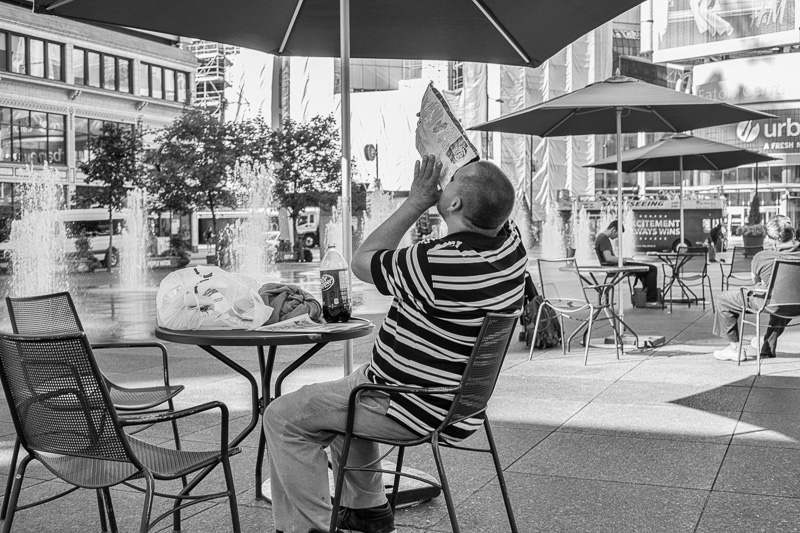
Ralph Meriwether led the tactical team that stormed the Cheetos factory. He had vowed never to move without proper intelligence, but after a hundred days, he knew little more than he did when the terrorists first seized the plant. There were ten of them. That much he did know. And they were well-armed and heavily organized. They didn’t make the usual demands. No calls for money or flights to South America. Instead, they described themselves as revolutionaries, rising up on behalf of workers everywhere. Meriwether was at the bullhorn when they made that claim and he blasted his voice back to them from the command center: “Are you talking about all workers everywhere or just workers in Cheetos factories?” According to their leader, it was a matter of solidarity; they were acting for all workers everywhere. “We want proper health care,” they shouted. “A living wage. The right to organize.” They were unionistas.
By nature, Meriwether was a peaceful man and he had hoped that patience would break the stand-off. As long as the terrorists didn’t threaten to kill the hostages, he would keep them talking. It would dwindle their supplies. But after a hundred days, it was clear that they were well stocked. When Meriwether cut off the power, the lights flickered on again after only a minute of darkness. When he shut off the water, they put a hostage in each window with a squeegee and a bucket as if to say: “Look. Look at us. We have water enough to waste.” As for food, Meriwether had no idea how they fed themselves. All he could say for certain was that nothing came in from the outside.
The media marked a hundred days in captivity with headlines on the front page of papers all across the country and with special television reports on the Comedy Channel. Pundits questioned whether Meriwether had the balls to bring down the terrorists. But they didn’t foist all the responsibility on him. They asked the same question of the Department of Homeland Security. Even of the White House. Although Meriwether winced at the negative publicity, he took a secret pleasure at hearing his name mentioned in the same sentence with the president’s. Now, when he yelled through the bullhorn, his voice crackled with authority. And when he walked from his car to the command center, he did so with a certain swagger.
Homeland Security decided to end the nonsense. While they began talks about acceptable losses, Meriwether developed a strategy. Everything was optimized for the local news cycle. At 13:00 hours, Meriwether’s team stormed the Cheetos factory. The commandos had been trained by the same Navy Seals who brought down Osama Bin Laden. Their orders were to shoot all the terrorists. If any terrorists survived, it would be inconvenient. They would have to be questioned and there would be trials. Everybody knows that a trial is just a forum for the guilty to get public sympathy. Meriwether’s people went in with guns blazing. Hardly any hostages died.
Initial reaction was favourable. Where, before, the media had criticized Meriwether as bumbling and indecisive, now they called him a hero. There was even talk of a ticker tape parade. But media adulation is a fickle thing. In the case of Meriwether, it lasted until all the hostages had been debriefed and were released to the care of their families. Many gave interviews and invariably they spoke out against Meriwether.
“He killed the Cheetos Ten,” they said. “They were some of the nicest people!” and the screen would show photos of the Cheetos Ten with vignette filters and poignant violin music in the background.
Meriwether lost his temper. How naïve could people be! A bunch of liberal softees with mush for brains. That’s what they were. He tried to explain the effects of Stockholm Syndrome, but he got bogged down in technical language, so the interviewer broke for a commercial before it got too boring.
Something he noticed: the hostages all looked the same. Every one of them was obese—at least three hundred and fifty pounds.
“Wasn’t it horrible?” people asked of the hostages.
“No way,” they answered. “We had a great time, you know, these last hundred days.”
“And what did you live on?”
“Cheetos, of course. Our friends, they let us eat as much as we wanted.”
“But no variety in your diet?”
“Are you kidding? There was lots of variety. Cheetos. Cheesie Puffs. Curly-Cues. Twisties. And we washed it all down with as much pop as we could drink.”
“Seriously?”
“A light refreshing snack.”
After the commando raid, public backlash struck with a fury. People wanted Meriwether’s head served up on a platter. They loved the terrorists and were tired of the patronizing commentary. Reporters stood on street corners and conducted impromptu interviews. They wanted to know what the average guy on the street thought. They spoke to fat men in orange bandanas: “They’re just like us, these terrorists.” Obese women on orange reflective vests screamed into the camera: “They were only defending our right to eat junk food.” The terrorists became the so-called terrorists became the martyrs. What was their crime? All they’d done was give a few ordinary Americans what they wanted.
Meriwether turned off the TV and shook his head. It was like the whole fucking country had been taken hostage and was suffering from Stockholm Syndrome. The way people talked, it was like Cheetos were goddamed communion wafers. Leaning way back in his easy chair, he fitzed open another can of beer and balanced it on his stomach, watching the condensation dribble onto the patch of shirt just above his belly button. Sucking the foam off the top, he wondered if he would have felt differently if the terrorists had taken over a brewery.